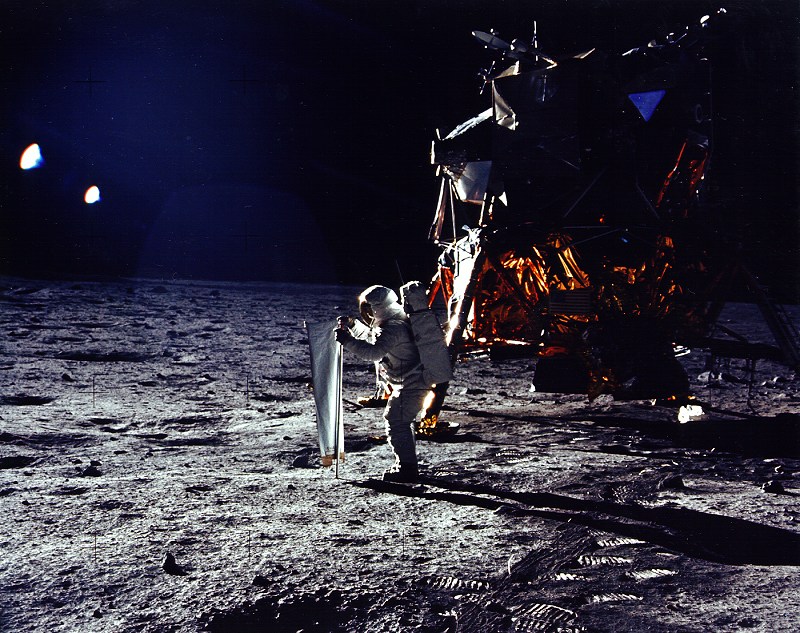On July 20, 1969, I was 16 years old, and I had a lot of things on my mind. I was a chicken farmer for the Future Farmers of America at the time, and I remember I was having problems with possums going after my brood house. Then there was Douglas Southall Freeman’s biography of Robert E. Lee, which I was reading at the time. And I was also reading one of “Doc” Smith’s novels that day. I don’t remember exactly which one, but it was one of the Skylark books, not the Galactic Patrol.
And then there was this minor little expedition, something called . . . “Apollo 11,” I think. [G]
Actually, in a lot of ways, I was less excited on the 20th than I’d been when I watched the televised launch (in black and white, of course) on the 14th. It hadn’t really percolated through my brain that I was going to see real, live TV from the surface of the Moon, and boy, oh, boy, had that Saturn V launch been exciting! And then, there it was—late at night, sitting up, watching, and there was Neil Armstrong actually standing on the surface of the Moon.
I knew I was seeing something special, something that was never again going to happen for the very first time, but I was sixteen. I had no notion of how I would look back at that day from 40 years down the road. And I think that those of us who saw it then, that night, live, sometimes fail to realize how much more stupendous those grainy, poor quality black-and-white images were for us than for the (literally) two generations who have seen them since as archive footage. In some ways, it’s like the opening sequence from the original Star Wars movie. When we sat in the theater and watched that huge starship rumbling by overhead, moving out into the screen for what seemed like forever, and then realized it was the little ship, we were seeing something moviegoers had never seen before. Now it’s old hat, and people who first saw it on the little screen are never going to be as impressed by it as we were when we saw it on the big screen for the very first time.
I think it’s like that for people who don’t remember 1969 first-hand. It’s that sense of “old hat.” Of “been there, done that.” Space shuttles, space stations, communications satellites, GPS—they’re all part of our everyday, taken-for-granted world in 2009, not part of an incredible odyssey. We’ve lost that sense of wonder, of reaching out for something totally new, of being committed to and witnesses of one of the human race’s unique and enormous accomplishments, and in its place, I think, we’ve turned inward. These days, we’re thinking small, with a sort of what I can only think of as guiltiness as we look back at the “hubris” of that commitment to grand scale achievement.
I want that hubris back. I want us to be accomplishing unique and enormous things again, with the confidence that we can accomplish them. I want manned spaceflight, not just back to the Moon, but beyond that. And I want my daughters and my son to have their own July 20, 1969, to remember.
Apollo 11 didn’t give us wings; it only showed us how far the wings we had would take us.
David Weber is an American science fiction and fantasy author. He is perhaps best known for the Honor Harrington series, consisting of eleven books, with over three million copies in print. His most recent novel, By Heresies Distressed, is available now from Tor Books.










